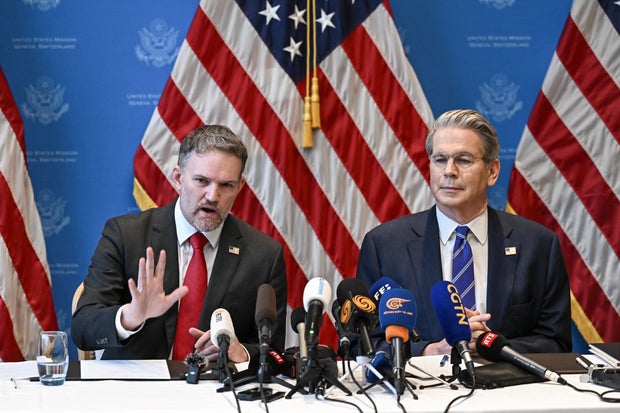The U.S. and China have agreed to a temporary but significant easing of the tariffs imposed over the last couple months, the countries said in a joint statement shared by the White House, heralding significant success in trade negotiations that ramped up over the weekend.
In the joint statement released early Monday morning, the two sides said they had agreed that ongoing “discussions have the potential to address the concerns of each side in their economic and trade relationship,” and that “moving forward in the spirit of mutual opening, continued communication, cooperation, and mutual respect,” both parties had committed to a 90-day suspension of most of the levies imposed since early April.
“We have reached an agreement on a 90-day pause,” U.S. Treasury Secretary Scott Bessent told reporters in Geneva, Switzerland, where he spent the weekend in meetings with Chinese counterparts. He said Washington and Beijing would reduce their reciprocal tariffs by 115 percentage points for three months to give the negotiations room to move forward.
Bessent said the temporary reductions would effectively reduce the level of U.S. tariffs still in place on Chinese goods to about 30%, while China was reducing its levies on American imports to 10%.
The White House’s imposition of levies amounting to some 145% on all goods imported from China, and Beijing’s retaliatory tariffs of 125% on American imports, had cast a long shadow over global financial markets as the world’s two biggest economies spent the early spring appearing to entrench in a trade war.
The high tariffs had virtually frozen trade between the U.S. and China, with major American ports reporting a drastic drop in traffic.
“The consensus from both delegations this weekend is neither side wants a decoupling,” Bessent told reporters in Geneva on Monday. “And what had occurred with these very high tariff… was an embargo, the equivalent of an embargo, and neither side wants that. We do want trade. We want more balanced trade. And I think that both sides are committed to achieving that.”
In another sign that the U.S. may be ready to relent on its protectionist trade policies, President Trump on May 8 announced a pact with the United Kingdom under which the U.S. will lower tariffs on British cars from 27.5% to 10%, while also scrapping levies on steel and aluminum.
Stock market boost
Commodities and currency markets in Asia and beyond were buoyed significantly on the news of a breakthrough in the negotiations on Monday. Stock futures in the U.S. also soared, with the Dow gaining more than 1,000 points ahead of trade opening in New York on Monday, while the S&P 500 and Nasdaq Composite jumped 3.2% and 4%, respectively.
Speaking Sunday, Bessent said there had been “substantial progress” in the talks between U.S. and Chinese officials in Geneva, while Greer teased that an agreement had been reached but offered no details.
“It’s important to understand how quickly we were able to come to agreement, which reflects that perhaps the differences were not so large as far as maybe thought,” Greer told reporters on Sunday.
Despite the cooldown, some Wall Street analysts questioned whether the truce will last and if the sides are committed to forging a more permanent agreement to ease tensions.
Bessent “stated that neither the U.S. nor China wants decoupling. We are skeptical,” Wei Yao, head of research Asia Pacific at Societe Generale Group. “To us, the thinking on reducing reliance on China for the supply of critical material seems more permanent, even though the U.S. may not mind continuing to buy clothes, toys or even iPhones from China.”

